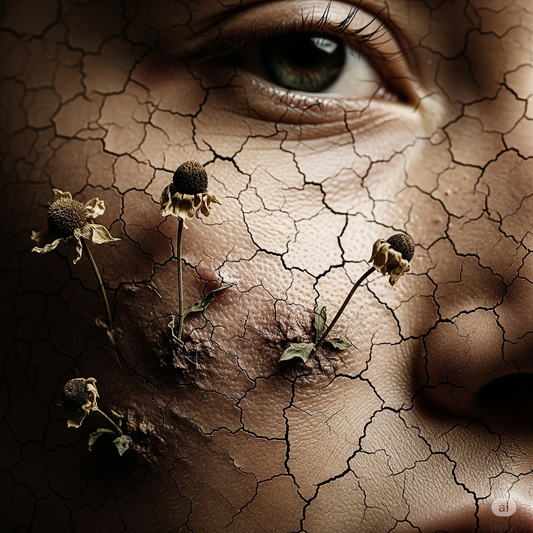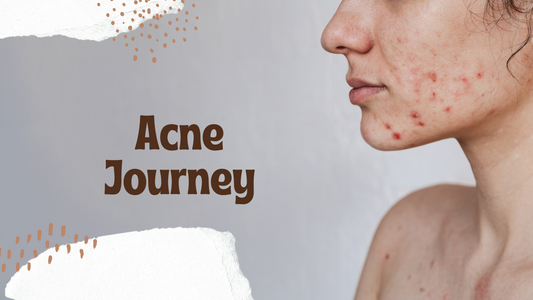Introduction
Thyroid disorders affect millions of people worldwide and can significantly impact various bodily functions, including metabolism, energy levels, and even skin health. The thyroid gland produces hormones that regulate cell turnover, hydration, and overall skin integrity. When thyroid hormone levels become imbalanced—either too high (hyperthyroidism) or too low (hypothyroidism)—the skin can undergo noticeable changes. Understanding how thyroid disorders affect the skin is crucial for managing symptoms effectively and maintaining healthy skin.
The Role of the Thyroid in Skin Health
The thyroid gland produces two main hormones: triiodothyronine (T3) and thyroxine (T4). These hormones regulate metabolism, skin cell renewal, and collagen production. Healthy thyroid function ensures:
-
Proper hydration of the skin
-
Regulation of oil production
-
Timely shedding and renewal of skin cells
-
Maintenance of skin elasticity and smoothness
When thyroid function is disrupted, the skin often provides early warning signs of an underlying condition.
Hypothyroidism and Its Effects on Skin
Hypothyroidism occurs when the thyroid gland does not produce enough thyroid hormones. This condition can be caused by autoimmune diseases like Hashimoto’s thyroiditis, iodine deficiency, or other factors that impair thyroid function.
Common Skin Symptoms of Hypothyroidism:
-
Dry, Rough Skin: Reduced thyroid hormone levels slow down the turnover of skin cells, leading to dryness and flakiness.
-
Puffiness and Swelling: Hypothyroidism can cause fluid retention, leading to puffy skin, especially around the eyes.
-
Cold Sensitivity: Poor circulation due to slowed metabolism can make the skin feel cold and appear pale.
-
Thickened, Scaly Skin: Prolonged hypothyroidism can lead to thick, coarse skin with a waxy appearance.
-
Slow Wound Healing: Skin regeneration is delayed, making it harder for wounds or cuts to heal.
-
Brittle Nails and Hair Loss: Hair and nails may become dry, brittle, and more prone to breakage due to reduced keratin production.
-
Yellowish Skin Tone: Impaired conversion of beta-carotene to vitamin A may result in a yellowish skin tint.
Hyperthyroidism and Its Effects on Skin
Hyperthyroidism occurs when the thyroid gland overproduces thyroid hormones, leading to an increased metabolic rate. This condition is often caused by Graves’ disease, an autoimmune disorder that stimulates excessive thyroid activity.
Common Skin Symptoms of Hyperthyroidism:
-
Warm, Sweaty Skin: Increased metabolism causes excessive sweating and an inability to tolerate heat.
-
Red, Flushed Skin: Overactive thyroid hormones lead to vasodilation, making the skin appear red or flushed.
-
Itchy Skin: Increased blood flow and sensitivity can cause persistent itching.
-
Thin, Fragile Skin: Excess thyroid hormones can break down collagen, making the skin more delicate and prone to bruising.
-
Increased Acne and Oiliness: Overactive sebaceous glands can lead to oily skin and breakouts.
-
Pretibial Myxedema: In Graves’ disease, some patients develop thickened, reddish skin on the shins due to mucopolysaccharide accumulation.
-
Hair Thinning: Excess thyroid hormone can accelerate the hair growth cycle, leading to increased shedding and fine, thinning hair.
Thyroid Disorders and Autoimmune Skin Conditions
Thyroid dysfunction is commonly associated with autoimmune conditions that affect the skin. Some of these include:
-
Vitiligo: Autoimmune thyroid diseases are often linked with vitiligo, a condition where pigment-producing cells are destroyed, leading to white patches on the skin.
-
Chronic Urticaria (Hives): An overactive immune system in thyroid disorders can contribute to persistent, unexplained hives.
-
Alopecia Areata: This autoimmune condition causes patchy hair loss and is frequently seen in individuals with thyroid disease.
-
Psoriasis and Eczema: Thyroid hormone imbalances may worsen inflammatory skin conditions like psoriasis and eczema.
Managing Skin Symptoms of Thyroid Disorders
Effective treatment of thyroid-related skin issues involves addressing the underlying thyroid dysfunction while incorporating targeted skincare strategies.
1. Medical Management:
-
Proper thyroid hormone replacement therapy (levothyroxine for hypothyroidism and antithyroid drugs for hyperthyroidism) is essential.
-
Regular monitoring of thyroid hormone levels helps in adjusting medication dosages.
-
In autoimmune cases, addressing inflammation with immunomodulatory treatments may be necessary.
2. Hydration and Moisturization:
-
For hypothyroid patients, using rich, emollient moisturizers containing ceramides and hyaluronic acid helps restore skin hydration.
-
For hyperthyroid patients, lightweight, oil-free moisturizers can help manage excess oiliness.
3. Sun Protection:
-
Both hypothyroidism and hyperthyroidism can make the skin more sensitive to UV rays. Using a broad-spectrum sunscreen with SPF 30 or higher is essential.
4. Balanced Diet:
-
For hypothyroidism: Include iodine-rich foods like seaweed, fish, and dairy to support thyroid function (unless iodine restriction is advised).
-
For hyperthyroidism: Avoid excessive iodine intake and consume cruciferous vegetables (broccoli, cabbage) that naturally help regulate thyroid activity.
-
General skincare nutrients: Zinc, selenium, and omega-3 fatty acids support skin barrier function and thyroid health.
5. Lifestyle Adjustments:
-
Regular Exercise: Helps improve circulation and reduce fluid retention.
-
Stress Management: Chronic stress can worsen autoimmune thyroid conditions, so mindfulness, yoga, and relaxation techniques may be beneficial.
-
Adequate Sleep: Sleep is crucial for skin repair and overall metabolic balance.
Conclusion
The skin is often a reflection of internal health, and thyroid disorders can significantly impact its texture, appearance, and overall condition. Whether it’s dry, flaky skin from hypothyroidism or sweaty, sensitive skin from hyperthyroidism, managing thyroid health is key to restoring skin balance. With proper medical treatment, skincare routines, and lifestyle adjustments, individuals with thyroid disorders can maintain healthier, more resilient skin.
References
-
Biondi, B., & Cooper, D. S. (2019). "The Clinical Significance of Subclinical Thyroid Dysfunction." Endocrine Reviews, 40(2), 318-345.
-
Smith, T. J., & Hegedüs, L. (2016). "Graves' Disease." The New England Journal of Medicine, 375(16), 1552-1565.
-
Krysiak, R., & Okopień, B. (2012). "The Effect of Thyroid Dysfunction on Skin Conditions." Journal of Clinical Endocrinology & Metabolism, 97(10), 3435-3440.
-
Wiersinga, W. M. (2016). "Thyroid Autoimmunity and Skin Manifestations." Nature Reviews Endocrinology, 12(11), 628-640.
-
Dermato-Endocrinology (2020). "Impact of Thyroid Disorders on Skin Health and Dermatological Manifestations." Dermato-Endocrinology Journal, 12(3), 175-190.






